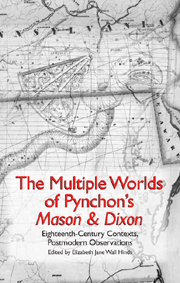 The Multiple Worlds of Pynchon's 'Mason and Dixon'
The Multiple Worlds of Pynchon's 'Mason and Dixon' Book contents
- Frontmatter
- Contents
- Preface
- Note on Quotations from Mason & Dixon
- The Rounds of History
- Consumption Then and Now
- Space and Power
- Enlightenment Microhistories
- 6 Haunting and Hunting: Bodily Resurrection and the Occupation of History in Thomas Pynchon's Mason & Dixon
- 7 “Our Madmen, our Paranoid”: Enlightened Communities and the Mental State in Mason & Dixon
- 8 General Wolfe and the Weavers: Re-envisioning History in Pynchon's Mason & Dixon
- Works Cited
- Notes on the Contributors
- Index
8 - General Wolfe and the Weavers: Re-envisioning History in Pynchon's Mason & Dixon
from Enlightenment Microhistories
Published online by Cambridge University Press: 12 September 2012
- Frontmatter
- Contents
- Preface
- Note on Quotations from Mason & Dixon
- The Rounds of History
- Consumption Then and Now
- Space and Power
- Enlightenment Microhistories
- 6 Haunting and Hunting: Bodily Resurrection and the Occupation of History in Thomas Pynchon's Mason & Dixon
- 7 “Our Madmen, our Paranoid”: Enlightened Communities and the Mental State in Mason & Dixon
- 8 General Wolfe and the Weavers: Re-envisioning History in Pynchon's Mason & Dixon
- Works Cited
- Notes on the Contributors
- Index
Summary
THROUGHOUT HIS NOVELS, Thomas Pynchon combines strict fidelity to previously forgotten historical records with conjectural or fantastic narratives which nevertheless contribute to making a moral or political argument. In Mason & Dixon, he employs this characteristic strategy with events at the intersection between two kinds of narrative in eighteenth-century history. The first concerns labor history, and in particular the wages for weavers, who were among the first workers to experience the effects of an early industrializing economy. This narrative interest figures in Mason & Dixon because of the efforts of weavers in the southwest of England in late 1756 and early 1757 to obtain an increase or at least to avoid a decline in wages through group action such as strikes, public assemblies, and machine breaking. The second, intersecting strand at work in Pynchon's novel is military and imperial history, specifically the presence of Colonel (later General) James Wolfe in Stroud and surrounding areas of Gloucestershire to keep the peace in late 1756. Pynchon's account of the events that brought together the weavers and General Wolfe is striking and illuminating for the accuracy of many of its elements, for the way it re-animates this important episode in English history, and for its substantial inaccuracies and fictionalizing. Through this combination of scholarly accuracy and imaginative fabrication, Pynchon shows Mason and Dixon's ability to move outside their expected ideological positions, but he misses the opportunity to recognize Wolfe making the same step.
- Type
- Chapter
- Information
- The Multiple Worlds of Pynchon's 'Mason and Dixon'Eighteenth-Century Contexts, Postmodern Observations, pp. 185 - 198Publisher: Boydell & BrewerPrint publication year: 2005


